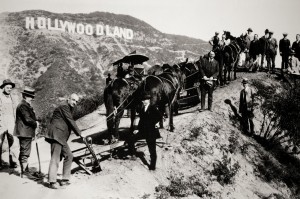Robert Redford said, “Whereas money is a means to an end for a filmmaker, to the corporate Hollywood mind, money is the end.” This attitude may why he received the French Légion d’Honneur* in 2010. Indeed, if the first part of this quote truly represents the French idea of how the cinema should be thought, the second is the reason why France tends to resist to the Hollywood industry within its cultural borders. According to a 2004 study**, the American movies dominated 62% of the market in Italy, 78% in Spain, 84% in the United Kingdom, against “only” 47% in France. This phenomena proves worldwide; even in Japan, which at some point used to refuse it more than most of the industrialized countries and where 10 out of 15 movies were American this same year. This makes sense with regards to the historical legacy of the American movies which took the advantage of the European interior market’s weakening from the end of the World War I to expand their own overseas, and to this lasting willingness of the American companies to keep going on with this idea of constant economic development over time and space for making more profit.
After our tour in the IMAX Studio this Monday, most of us got confused about the potential overwhelming presence in the movie market of those intriguing blockbusters full of explosions and possibly destitute in interesting plots, which accumulate eye-catching signs on each road of Hollywood, creating great commercials and grabbing quick attention, and targeting young people. This reminded me of my first American movie theater experience at the beginning of the year. I got disoriented watching this succession of trailers saturated with spectacular special effects seeming to compete against each other; I was waiting for one savior movie, which less noisy and overpowering, would surprise me in a more simple balance between realism and originality.
In other words, being so French that I prefer drinking coffee than eating popcorns while watching a movie, I had French expectations. But whatever the French resistance is, the American movies domination over the world is definitely more related to economic considerations than to the willingness of a cultural hegemony. This can be profitable to other cinemas: the American investments in the national cinemas worldwide offer to non-American movies the possibility of first financing themselves and second of stimulating creativity in favor of innovative ideas. For examples, the very favorable outcome of the 2005 French March of the Penguins revealed a new public for docufictions, which are not that developed in the United States; an opportunity non-Americans should seize to play their cards right. Then, the 2008 French comedy film Bienvenue chez les Ch’tis [Welcome to the Land of Shtis] almost equalized the success of Titanic in the French box office, being seen by 20.5 million people in 23 weeks, which proves that as we say in French, “the painting is not completely dark”.
* a French order established by Napoléon Bonaparte in 1802.
**Observatoire Européen de l’Audiovisuel, Focus 2005, Tendances du Marché Mondial du Film, 2005.


